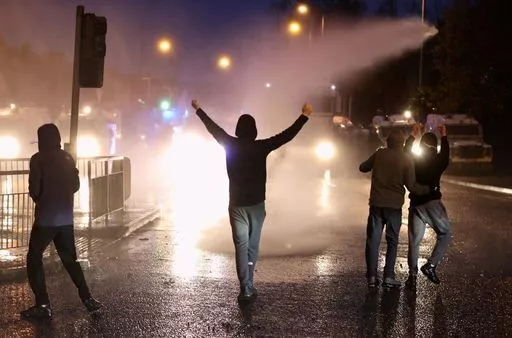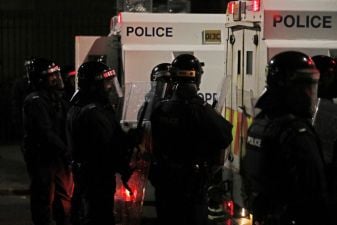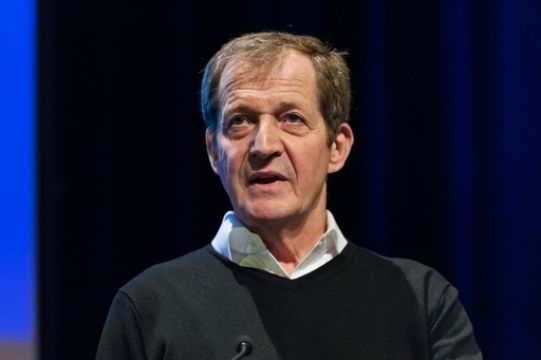Alastair Campbell had a front row seat to the Good Friday Agreement when it was signed in 1998, as a close adviser to then-British prime minister Tony Blair, and he now feels the main stakeholders (particularly the UK government) are not doing enough to maintain it.
Tensions over the Northern Ireland Protocol, particularly the controversial Irish Sea border, have led to ugly scenes in the North with plenty of fear this could soon become the norm again rather than a rarity.
Mr Campbell spoke to breakingnews.ie about what he described as the “alarming” indifference of UK prime minister Boris Johnson.
“I find what’s going on really alarming, and I am utterly baffled, but also sickened at the seeming indifference of the prime minister and the government,” he said.
“I’m not somebody who thinks that just because people chuck a few petrol bombs, everybody should sort of run to their attention, I don’t believe that, and I’ve never believed that; but this went on day after day.
“There are real issues at the heart of it, which for some reason this government does not want to address.”
He pointed to Mr Johnson's previous promises about the sea border as a catalyst for the scenes we are now witnessing in the North.
Tony Blair always used to say, and this became a bit of a mantra for us, ‘this peace process is going to move forwards or backwards, it’s never going to stand still’.
“I believe the reality of Brexit is coming home to roost and the fact is that Boris Johnson made specific promises, particularly to unionists, that there would be no border in the Irish Sea, there now is.
“It has reignited tensions which had been bubbling away under the surface for a while. Then add in the Bobby Storey funeral, long standing social and economic issues that have not been addressed in the way that they should.”
Mr Campbell outlined his belief that maintaining the tenets of the Good Friday Agreement will always be an ongoing process, adding that these requirements are not being met at the moment.
“Tony Blair always used to say, and this became a bit of a mantra for us, ‘this peace process is going to move forwards or backwards, it’s never going to stand still’.
“You do worry about what’s happening at the moment, there’s a real danger that it has moved backwards.
“It’s a political process, it’s built on political compromise. They require political management, but if you have a UK government that is not engaging in the way I think it should as a priority, and you have a European Union which has been an important part of the process, then relations between the EU and UK are not that great, the Irish trying to do what they’re doing, it's a perfect storm almost.”
He feels the greatest danger is that the violence will become “normalised”.

“My worry is that this thing gets normalised too quickly. If this was happening in any other part of the UK, it would be 24-hour news here. If it was Glasgow, Newcastle, anywhere.
“I worry that it’s becoming normalised again, that we kind of say ‘oh, it’s Northern Ireland, there’s nothing you can do about it’.
“There’s a danger that we’re going to go back to that feeling in England, Scotland and Wales. The danger that we’re going to go back to that thinking of, ‘oh it’s Northern Ireland, they gave it a good shot, but it’s never going to work’.”
“It can work. The Good Friday Agreement was signed 23 years ago last week, it came good. It’s always been hard work, it’s never been straightforward. You’ve got to keep going in giving it the care and attention it needs, what I worry about is government doesn’t understand that it needs that constant care and attention,” he added.
Mr Campbell feels the prime minister would rather ignore issues in the North than deal with them head on.
Johnson has got a capacity for lying which is pretty spectacular, and they’re still lying.
“There are a lot of reasons why Brexit happened, but I think it’s fairly accepted that a lot of things were said that simply weren’t true. Johnson has got a capacity for lying which is pretty spectacular, and they’re still lying.
“They lied to the unionists when he said he’d never agree to a sea border, he did. He said it wasn’t in the agreement. What we’re seeing is the consequence of the choices people made, choices have consequences and the consequence of this border, and the protocol they’ve reached, the way it was reached and the lies they’ve told have fuelled anger and division. We know where anger and division can go if you’re not very careful.
“I think they want people to just forget about Brexit, as if it was an act of God, we’ve just to deal with it. It was a choice and those choices are now playing out in very dangerous ways.
“If you think about the reaction to Brexit, that sense of betrayal, then obviously if you’re a passionate unionist, and you see the possibility of a united Ireland, that’s bound to cause concern.”
The violence in the North arrived not long after further discussion over the prospect of a united Ireland referendum.
Tánaiste Leo Varadkar and Sinn Féin leader Mary Lou McDonald debated the matter on Claire Byrne Live recently and many were surprised at similarities in their view points.
Both felt a Border poll was a goal that should be worked towards, but they both felt it would be some time away.
Mr Campbell was in agreement, emphasising the fact that peace should be protected as the priority.
Border poll
“For obvious reasons there’s massive interest in the possibility of a Border poll in the future, but I don’t think we’re at that point yet.
“I think it’s really important that our government, and anybody who has a vested interest in the Good Friday Agreement being maintained, it’s really important that people understand that you’ve got to give it that care attention and focus and not allow violence of this sort to become normalised. The minute it becomes normalised, then I think we’re in a very bad place.”
While he feels US president Joe Biden's commitment to the Good Friday Agreement can only be a positive, Mr Campbell feels any direct involvement from the States should only be as a last resort.
“The American government will be following this in a way that the Trump administration probably would not have.
“If it’s needed, Biden understands it a lot better than other foreign leaders and even some in our own government. When you talk about putting pressure on you have to be very careful in these situations, but I do think Biden is somebody who will get involved if he really sees things going wrong, and I think that would be a good thing.”
Mr Campbell's latest book of diaries starts in 2010, when the Conservative Party and the Liberal Democrats formed an unprecedented coalition to form a government.
Ireland has more experience of coalition than we have, we’ve had very little experience.
Asked what he thinks of our coalition government of Fianna Fáil, Fine Gael and the Green Party, Mr Campbell said it can be a positive despite the obvious issues of such an alliance.
“Ireland has more experience of coalition than we have, we’ve had very little experience.
“I was surprised, one of the things that comes through in the new book, is actually I was quite surprised at how the Britain accepted the idea of a coalition.
“There’s something about politicians of different parties working together that people sometimes quite like.
“One of the things that’s a real problem in our politics at the moment, the public like it when they see politicians that are putting them, the public, first.
“The minute the public think that politicians are putting themselves first, and I’m afraid with Johnson that’s what we’ve got at the very top, I just think it becomes very, very difficult.
“People who take lumps off each other in the campaign trail, it doesn’t mean that they can’t work together, and actually I think the public quite like when they do.”
Vaccine nationalism
Meanwhile, Mr Campbell feels the UK government is trying to use their rapid vaccine rollout as a tool to make people forget about Brexit and other issues in Britain.
He also warned of the dangers of vaccine nationalism.
“To my mind, the one thing that this government is obsessed about is the political management of the narrative. The fact is the rollout of the first dose in the UK was incredibly impressive, but they cannot resist because they want the public to forget just how bad things were, how many mistakes they made, and how much sense of corruption there’s been in contracting and so forth, they overdo it all the time.
“The public are not stupid, they know if something is going well or badly, and it doesn’t have to be rammed down their throats.

“I also think vaccination is clearly a part of the solution to the pandemic, but equally there has to be an international approach to this. If we’re all going to get back to a world in which we can travel freely, move more freely and so forth, we’ve got to get everywhere in a better state than we’ve been.
“Vaccine nationalism is not a very good one to play.
“They wanted to see if they could put a union flag on the bottle at one point, for god’s sake! It’s been an international operation, the guy that runs the company is French and a lot of the workers are from around the world etc.
“There’s nothing wrong with countries being proud of successes, but I think in this one, they’re trying to ramp it up as much as they can because they want people to forget the failures in the early days.”







